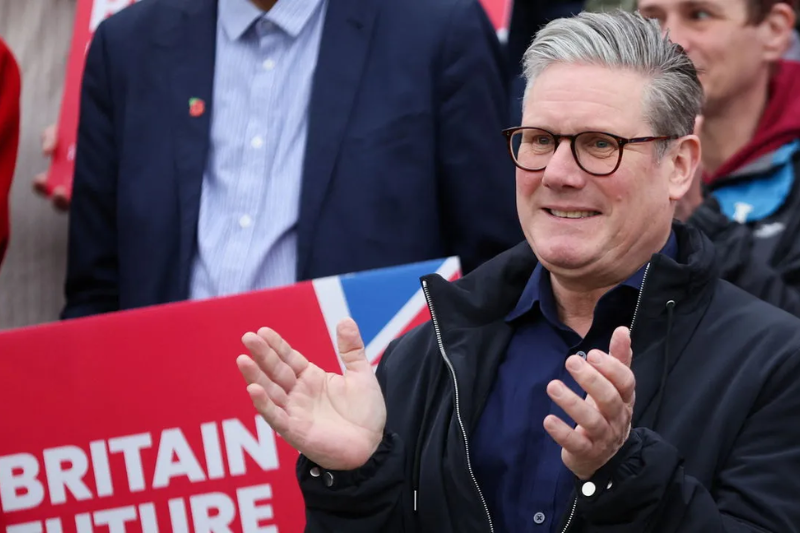
UK Election 2024: Story Behind Labour Historic Victory, and Conservative Party’s Defeat
The UK election results declared now and Keir Starmer is set to become the next Prime Minister of Britain. Labour Party win majority in the parliamentary elections in UK. After the results Keir shared a post on his X account.
This victory marks the end of 14 years of often turbulent Conservative rule.
British Prime Minister Rishi Sunak conceded defeat and he acknowledged that the Labour Party had secured a win. “The Labour Party has won this general election, and I have called Sir Keir Starmer to congratulate him on his victory,” Sunak said after winning his parliamentary seat in northern England.
Historical Trends:
One major reason for the Conservative Party’s loss is voter fatigue. Historically, no British political party has ever won a fifth successive term in office. British politics tends to work in cycles with the two main parties usually getting a run of between 10 to 15 years before the public votes in the opposition.
The Tories ruled from 1979 to 1997, Labour from 1997 to 2010, and the Tories since then. Voters were simply ready for a change.
Economic Record and Policy Missteps
The Tories were also undone by their economic record. Tax rises and record levels of immigration have led to the return of Nigel Farage, a populist who pushed for Brexit and now leads Reform UK. Polls show Reform claiming about 15% of the vote, draining support from the Conservatives. Farage has expressed a desire to take over the Tories after the election.
“It’s obviously been extremely difficult,” says Steve Baker a Conservative lawmaker. Some lawmakers fear that a much-shrunken Tory party could dissolve after the election or submit to Farage.
Keep Reading
The collapse in Conservative support is a brutal end to a political arc that started in 2010. Successive scandals, including Boris Johnson being caught at parties during Covid-19 lockdowns and Liz Truss causing a market selloff with unfunded tax cuts, have eroded voter trust. Sunak, brought in to limit the damage, struggled to connect with the public. On a talk show last week, a woman asked him, “How can a prime minister who is richer than the king relate to any of our needs and struggles?” Sunak replied, “Sophie when it comes to food banks, I am always incredibly grateful to those who support them.”
Rise of the Labour Party
Under Keir Starmer’s leadership, the Labour Party has presented a compelling alternative vision, promising to address the cost-of-living crisis, invest in public services, and provide a more competent and ethical government. Starmer moved the party back to the more electable center ground, purging Jeremy Corbyn and rooting out anti-Semitism. Dominic Grieve, who worked closely with Starmer as DPP, said he “inspires loyalty because he comes across as being so transparently decent and rational.”
Rishi Sunak: The ‘Fall Guy’
Sunak shocked by calling for an early election in May despite the Conservatives trailing Labour by around 20 points in opinion polls. He had hoped the gap would close but instead faced a disastrous campaign. The campaign began poorly with Sunak getting soaked by rain while announcing the vote outside Downing Street. Further issues arose, including a gambling scandal involving aides and criticism over Sunak’s early departure from D-Day commemorative events in France.
Ed Costello, chairman of the Grassroots Conservatives organization, said, “We deserved to lose. The Conservative Party just appears exhausted and out of ideas. But it is not all Rishi Sunak’s fault. It is Boris Johnson and Liz Truss that have led the party to disaster. Rishi Sunak is just the fall guy.”
The Wider Political Context: Is the UK an Outlier in Europe?
The shift of the UK to the Left and Labour’s win comes at a time when Europe is broadly experiencing a right-wing populist surge. The recent European elections saw an unprecedented number of representatives from hard-right and far-right parties securing seats in the European Parliament. The UK appears to be bucking this trend but for how long?
Despite the expected seat count, the British right is far from dead. Reform UK, led by Nigel Farage, is set to exceed polling expectations and will influence the debate on the future direction of the Conservative Party. “It is possible that Farage’s splitting of the right has actually helped Starmer increase his majority in parliament,” a CNN report said.
Labor leader Keir Starmer proclaimed that the UK was “ready for change”. “The change begins right here because this is your democracy, your community, and your future. You have voted. It is now time for us to deliver,” he said after being re-elected to his seat in north London.
Now the Conservative Party will need to rebuild its identity in the wake of this electoral defeat. The rise of Reform UK indicates that hard-right sentiment remains strong among a significant portion of the electorate. Farage’s influence could drag the Conservative Party further to the right, complicating the political landscape for Labour and reshaping the UK’s political dynamics.



